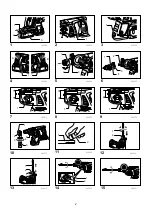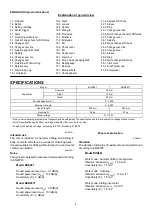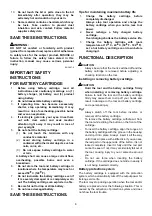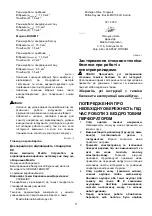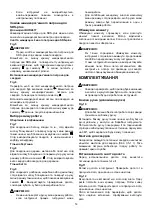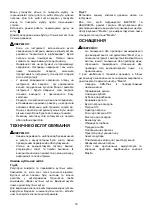
9
Blow-out bulb (optional accessory)
Fig.19
After drilling the hole, use the blow-out bulb to clean the
dust out of the hole.
Chipping/Scaling/Demolition
Fig.20
Set the action mode changing knob to the
symbol.
Hold the tool firmly with both hands. Turn the tool on and
apply slight pressure on the tool so that the tool will not
bounce around, uncontrolled. Pressing very hard on the
tool will not increase the efficiency.
Drilling in wood or metal
For model BHR261 only
Fig.21
Fig.22
Use the optional drill chuck assembly. When installing it, refer to
"Installing or removing the bit" described on the previous page.
Set the action mode changing knob so that the pointer
points to the
symbol.
For model BHR261T only
Fig.23
Fig.24
Fig.25
Use the quick change drill chuck as standard equipment.
When installing it, refer to "changing the quick change
chuck for SDS-plus " described on the previous page.
Hold the ring and turn the sleeve counterclockwise to
open the chuck jaws. Place the bit in the chuck as far as it
will go. Hold the ring firmly and turn the sleeve clockwise
to tighten the chuck. To remove the bit, hold the ring and
turn the sleeve counterclockwise.
Set the action mode changing knob to the
symbol.
You can drill up to 13 mm diameter in metal and up to 32
mm diameter in wood.
CAUTION:
•
Never use "rotation with hammering" when the drill
chuck assembly is installed on the tool. The drill
chuck assembly may be damaged. Also, the drill
chuck will come off when reversing the tool.
•
Pressing excessively on the tool will not speed up the
drilling. In fact, this excessive pressure will only serve
to damage the tip of your bit, decrease the tool
performance and shorten the service life of the tool.
•
There is a tremendous twisting force exerted on the
tool/bit at the time of hole breakthrough. Hold the
tool firmly and exert care when the bit begins to
break through the workpiece.
•
A stuck bit can be removed simply by setting the
reversing switch to reverse rotation in order to back
out. However, the tool may back out abruptly if you
do not hold it firmly.
•
Always secure small workpieces in a vise or similar
hold-down device.
MAINTENANCE
CAUTION:
•
Always be sure that the tool is switched off and the
battery cartridge is removed before attempting to
perform inspection or maintenance.
•
Never use gasoline, benzine, thinner, alcohol or the
like. Discoloration, deformation or cracks may
result.
Replacing carbon brushes
Fig.26
Remove and check the carbon brushes regularly.
Replace when they wear down to the limit mark. Keep
the carbon brushes clean and free to slip in the holders.
Both carbon brushes should be replaced at the same
time. Use only identical carbon brushes.
Use a screwdriver to remove the brush holder caps. Take
out the worn carbon brushes, insert the new ones and
secure the brush holder caps.
Fig.27
Remount the holder cap covers on the tool.
To maintain product SAFETY and RELIABILITY, repairs,
any other maintenance or adjustment should be
performed by Makita Authorized Service Centers, always
using Makita replacement parts.
ACCESSORIES
CAUTION:
•
These accessories or attachments are
recommended for use with your Makita tool
specified in this manual. The use of any other
accessories or attachments might present a risk of
injury to persons. Only use accessory or
attachment for its stated purpose.
If you need any assistance for more details regarding
these accessories, ask your local Makita Service Center.
•
SDS-Plus Carbide-tipped bits
•
Bull point
•
Cold chisel
•
Scaling chisel
•
Grooving chisel
•
Drill chuck assembly
•
Drill chuck S13
•
Chuck adapter
•
Chuck key S13
•
Bit grease
•
Side grip
•
Depth gauge
•
Blow-out bulb
•
Dust cup
•
Dust extractor attachment
•
Safety goggles
•
Plastic carrying case
•
Keyless drill chuck
•
Various type of Makita genuine batteries and chargers


